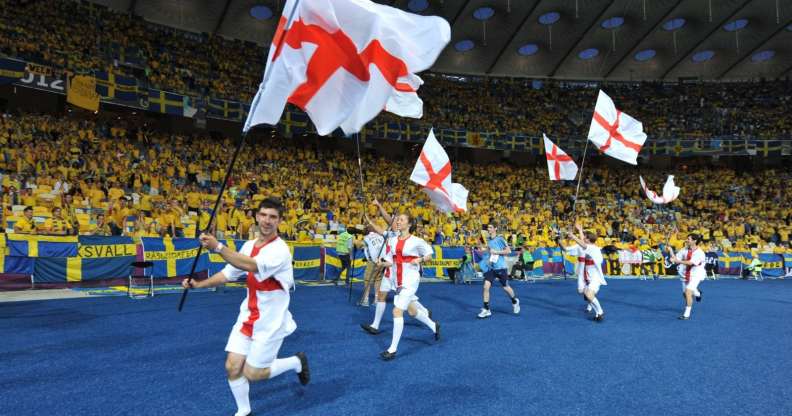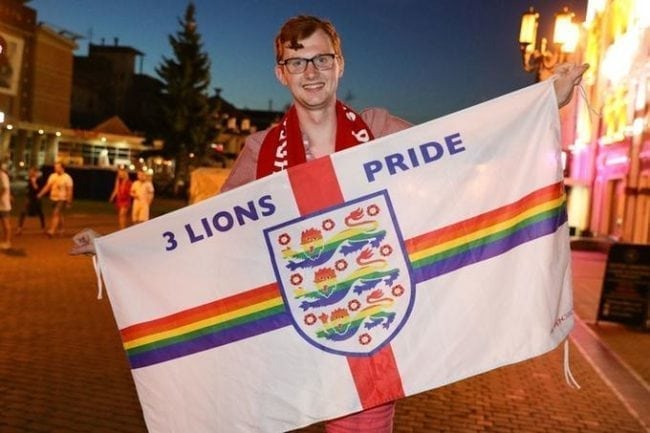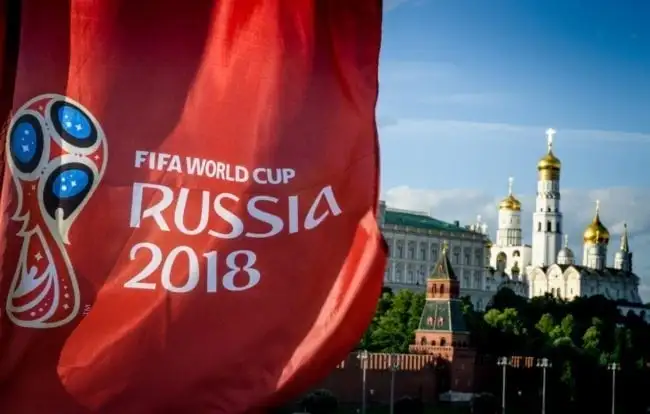England versus Sweden: Who wins at LGBT rights?

People wave the English flag before the Euro 2012 championships football match Sweden vs England on June 15, 2012 at the Olympic Stadium in Kiev. AFP PHOTO / GENYA SAVILOV (Photo credit should read GENYA SAVILOV/AFP/GettyImages)
Based on the state LGBT+ rights, PinkNews indicated Uruguay was the team to support in the 2018 FIFA World Cup in Russia—but the South American team was knocked out of the competition after losing against France on Friday. As England faces Sweden in the quarter-finals of the tournament on Saturday, on the same day and time as the Pride in London march, let’s see which team deserves to win if the competition was based on their LGBT+ rights record.
It’d be a tough match. The UK and Sweden both have a reputable international standing on LGBT+ rights. The 2018 Rainbow Map compiled by ILGA-Europe, the European Region of the International Lesbian, Gay, Bisexual, Trans and Intersex Association, puts both countries in its top 10.
Sweden easily took the lead on matters of LGBT+ rights, legalising homosexual relationships already in 1944 and becoming the first country to legally allow gender change in 1972—a process not without its obstacles. The UK first decriminalised homosexual relations for those aged over 21 in 1967—this only took effect in 1980 in Scotland and 1982 in Northern Ireland—but it wasn’t until 1994 that age of consent for two male partners was lowered to 18 years of age.

LGBT England fans were told to take down a Pride-themed England fan at a World Cup match (Photo by Aaron Chown/PA)
In that period, Sweden took down homosexuality from an official list of mental disorders (1979), banned discrimination in the workplace based on sexual orientation (1987) and, while in 1988 the UK approved the contentious Section 28 legislation banning schools and local authorities from “promoting” homosexuality, Sweden was including homosexual couples in its cohabitation law. In 1995, Sweden joined Norway and Denmark in officially recognising same-sex partnership through civil unions.
At the turn of the millennia, it was no doubt that England was trailing Sweden on LGBT+ rights, but it finally began to catch up. In 2002, equal rights were granted to lesbian and gay couples seeking to adopt—a year before Sweden legalised adoptions for same-sex couples. Insemination rights for lesbian couples in Sweden would have to wait until 2005.
Section 28 was finally repealed across the UK in 2003, and in the same year the country caught up with Sweden banning discrimination at work on the grounds of sexual orientation. The UK recognised a homophobic assault as hate crime in 2004, the same year that trans people were allowed to change their legal gender marker to reflect their preferred identity thanks to the Gender Recognition Act, and that same-sex couples won official recognition through the Civil Partnership Act.

The FIFA World Cup is in Russia for the first time (Photo by Mladen Antonov/AFP/Getty)
The law came into force in December 2005, with the UK finally closing the decade-long gap with Sweden—but the Nordic country once again took the lead in 2009, when transgender identity and expressions were officially included in the anti-discrimination act. Later that year, getting married became a fully gender-neutral process—allowing same-sex couple to legally wed. In took five more years for the British law to allow same-sex couples to get married, and only in England, Scotland and Wales while Northern Ireland still refuses to recognise marriage equality.
In 2013, Sweden finally corrected the abusive requirement of sterilisation from its law regarding change of legal gender and a compensation scheme to its victims was approved in March in the first-ever decision of this kind in the world. In its most recent evaluation of LGBT+ rights across the continent, ILGA-Europe noted that both in the UK and in Sweden there was increased discussion of trans and intersex rights and visibility of their experiences.
Both countries are in the process of simplifying the legal requirements for changes in official gender marker, but more work needs to be done. “Outlawing unnecessary surgeries on intersex infants would be a positive first step for the UK—a move that was recommended in last years’ Annual Review and also highlighted by UN treaty bodies,” ILGA-Europe writes in its report on the situation in the UK.
ILGA-Europe criticised Sweden for failing to provide LGBT+ asylum seekers with adequate protection—in contrast, the first safe house for LGBT+ asylum seekers and refugees opened in the UK in late 2017—following analysis from the Swedish Federation for Lesbian, Gay, Bisexual, Transgender and Queer Rights (RFSL). “The NGO RFSL had previously reported a significant increase in negative decisions for LGBTI asylum seekers and during 2017. The Swedish Migration Agency published their own evaluation of the handling of LGBTIQ asylum cases, concluding that one third of the decisions were of very low quality,” noted the ILGA-Europe report on Sweden.
Overall, ILGA-Europe this year awarded the UK a higher mark than Sweden when it comes to LGBT+ inclusivity, 73 percent versus 60 percent. As for whether the football field will reward the team representing the country with the better LGBT+ rights record, we’ll find out in just a few hours.

